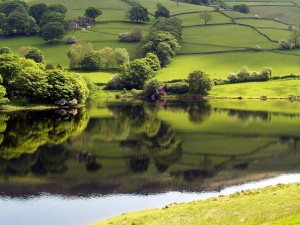Rick Perry, Republican governor of Texas and former candidate for the United States presidency, speaking about regulation on oil and gas exploration, stated: “I don’t believe we have the settled science by any sense of the imagination to stop that kind of economic opportunity.” This attitude, which arguably sacrifices the environment in favor economic growth, typifies the radical views on the environment held by self-styled conservatives in the United States. These statements are consistent with conservative opposition to environmental policy reform in the past couple decades. Conservative opposition on this issue has become well-known and far-ranging from chants of “Drill Baby Drill!” to outright denial of climate change among Republican members of Congress. This position, however, reveals a strong departure from conservatism by some of its most well-known supporters.
When seen through a political lens, the current debate over environmental issues reveals the problems inherent to American conservatism today. It is no longer responsive to change but instead proposes a one-size-fits-all solution in which economic productivity is the sole, and ultimate, goal. Conservatives can and must do better, but the first step is recapturing the original essence of conservatism so that the conversation can be steered back to solid ground from the current state of demagoguery and ideological posturing.
Conservatism, as conservative philosopher Michael Oakeshott defines it, is not a movement, an ideology, or set of principles. Instead, it is an orientation that seeks to conserve the benevolent order of what already exists, whether natural, political or social. The goal of conservation, therefore, is the essence of conservatism and to lose sight of this fact is to abandon it for radicalism.
Conservatism was born out of loss, out of the destruction of ancient modes of living by modernity. Its beginnings were in the early modern period, typified by Montaigne, and it reached its fullest articulation in response to the French Revolution. Conservatism recognizes that change brings destruction so it seeks to prevent change; however, it differs from reactionary ideology in that conservatism recognizes that history is dynamic, and that therefore change is unavoidable. As a result, conservatism seeks to implement change gradually.
The spate of current environmental crises could serve as the vehicle for a conservative renaissance. There can be no authentic conservatism that does not seek to conserve the environment. In order to minimize the destructive change that conservatives rightly fear, they must look to combat the potentially unprecedented effects of the environmental change. This is why Rick Perry’s desire for further oil exploration, echoed by fellow Republicans, is deeply unconservative, for it is rooted in a desire to maximize economic exploitation of the physical environment. For similar reasons, the desire of Ted Cruz to gut the EPA and dramatically expand production at every potential gas and oil site is deeply disconnected from the essence of conservatism.
 Wilfred McClay, in his essay on Michael Oakeshott, frames it coherently, writing that Oakeshottian conservatism is “corrective…rather than foundational.” This notion of conservatism as responsive and corrective must be embraced with regard to the environment. There is, however, a growing sense among small sections of conservative writers that the Republican approach to environmentalism is damaging and antithetical to authentic conservatism and Republicans do embrace this “corrective” understanding of conservatism. Rod Dreher at The American Conservative has continued that magazine’s proud tradition of revitalizing traditional conservatism by questioning the orthodoxy on the Right concerning environmentalism. Dreher exemplifies a burgeoning movement known as Front Porch Conservatives, which emphasizes sustainable local practices. Jonathan Adler, a law professor at Case Western Reserve University, wrote a paper outlining a plan for environmental reform borne out of conservative principles that recognizes the deficiencies of the current regulatory system. Adler starts from the point that protecting the environment is important, and, in the best tradition of conservatism, recognizes the need for change and offers a path forward that would mitigate damage and destruction to the present.
Wilfred McClay, in his essay on Michael Oakeshott, frames it coherently, writing that Oakeshottian conservatism is “corrective…rather than foundational.” This notion of conservatism as responsive and corrective must be embraced with regard to the environment. There is, however, a growing sense among small sections of conservative writers that the Republican approach to environmentalism is damaging and antithetical to authentic conservatism and Republicans do embrace this “corrective” understanding of conservatism. Rod Dreher at The American Conservative has continued that magazine’s proud tradition of revitalizing traditional conservatism by questioning the orthodoxy on the Right concerning environmentalism. Dreher exemplifies a burgeoning movement known as Front Porch Conservatives, which emphasizes sustainable local practices. Jonathan Adler, a law professor at Case Western Reserve University, wrote a paper outlining a plan for environmental reform borne out of conservative principles that recognizes the deficiencies of the current regulatory system. Adler starts from the point that protecting the environment is important, and, in the best tradition of conservatism, recognizes the need for change and offers a path forward that would mitigate damage and destruction to the present.
If conservatives do not extend their cautiousness towards change to the environment, conservatism will continue to lose ground with the public, and with it, a moderation central to the political process. The environment is an integral part of humanity’s patrimony and it cannot simply be set aside. If self-proclaimed conservatives in Washington and on the nation’s airwaves want to continue to be taken seriously, they must reassess their hardline, and largely unfounded, stances on environmental policy.
